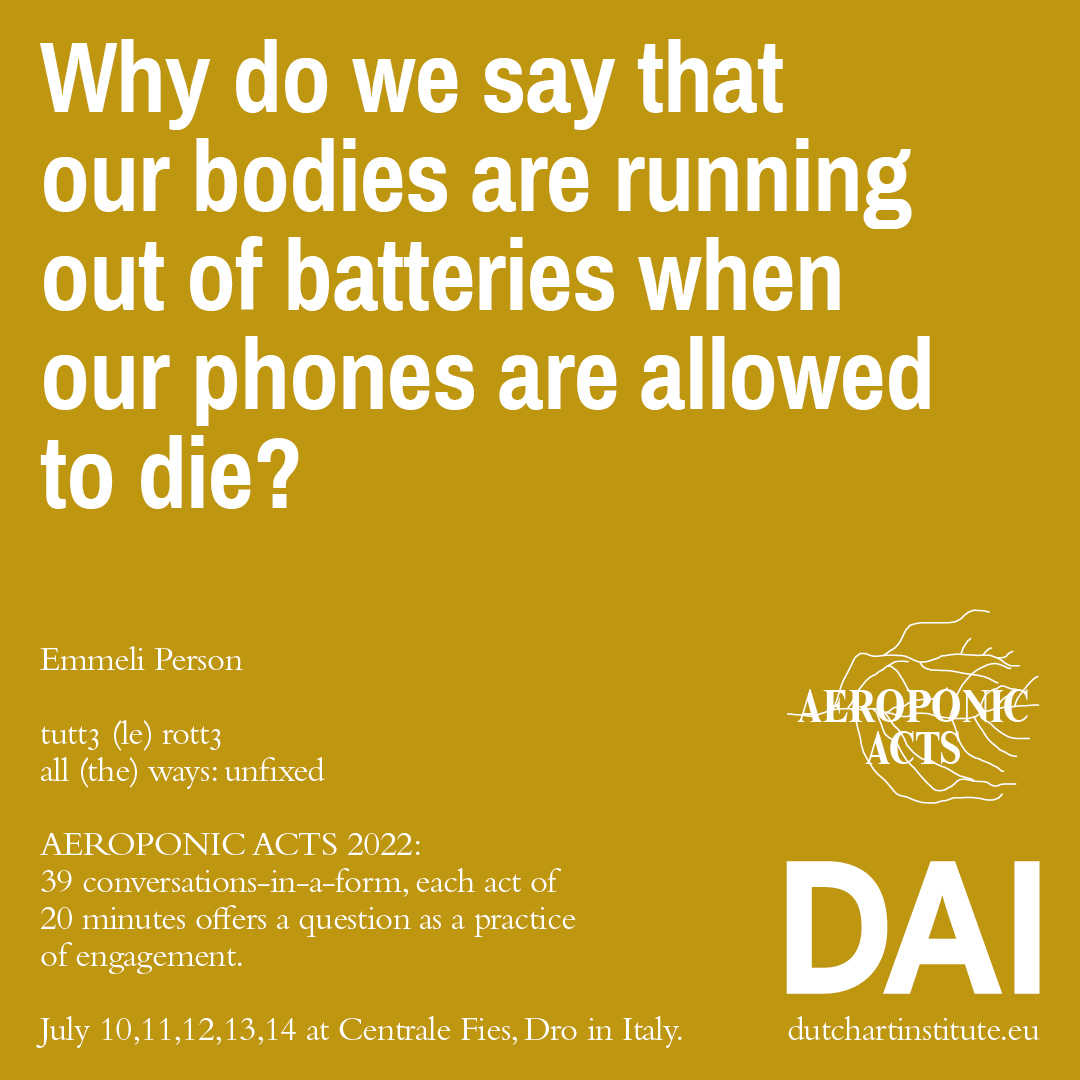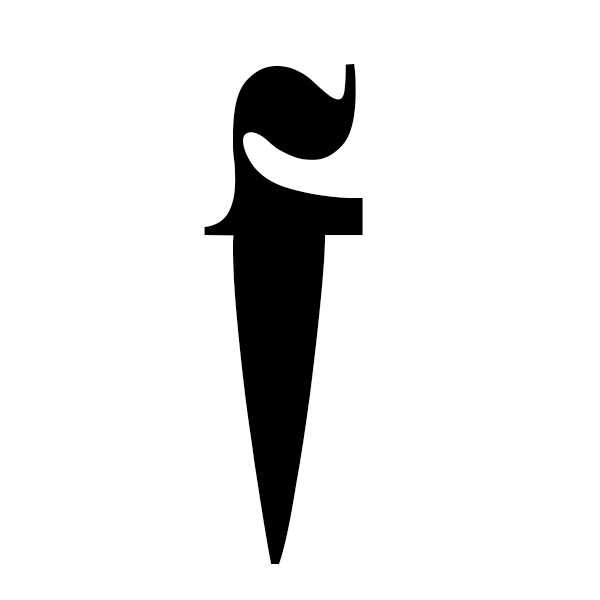Emmeli Person: Scapegoat vs. Escapecoat - don’t miss this incredible outsourcing opportunity
‘Aeroponic’ – root systems nourished by air – Acts is the name given to the nomadic Dutch Art Institute’s final Kitchen presentations. Each participant addresses one question, as a practice of engagement.
Here you will find the documentation of Emmeli Person's presentation as filmed by Baha Görkem Yalım. The written report is by Hubert Gromny and it includes a summary of the comments by esteemed guest respondents.
Scapegoat vs. Escapecoat - don’t miss this incredible outsourcing opportunity
Emmeli's question: Why do we say that our bodies are running out of batteries when our phones are allowed to die?
Emmeli's introduction: Haha, it’s funny when you think about how people used to believe in supernatural stuff. Like those worker gnomes that would live on farms and make sure you did your chores really well, otherwise they’d be unhappy and punish you. It’s kind of smart, cus then everyone would work harder and if something went wrong you’d have someone to blame. It’s a win-win situation really… outsourcing to fiction.
Hubert's report: The audience enters a dark space and is asked to “take a seat by the fire”. The stage seems to be empty while the installation of branches placed on the seats is illuminated by the red glow. The sound of cracking fire is coming out from the speakers accompanied by the vapor from the smoke machine. The green, narrow beam of light stage reveals the presence of Emmeli wearing a costume of a goat at the back of the stage. Emmeli steps forward and begins a spoken narrative mocking a corporate language constructed on the line between the mode of command and comical observations. The speech is interrupted by music—a stylization of contemporary pop into medieval minstrel tune. The brief moments of darkness mark the breaks between performative figures employed to deliver a monologue. The green spotlight reveals a goat-human presence to be talking, performing yoga exercises or bleating. Towards the end the speech becomes more poetic and more explicitly comments on the mythical dimension of corporate culture. At the end of the performance, the stage darkens, the music and sounds of cracking fire come back shifting attention to the “fireplace” glowing in red again. Fading out of the sound marks the end of the performance.
Ana Teixeira Pinto commented on the performance as the play between higher and lower rationale, the one of the imperative corporate speech of command and the other of comical observations. Reflecting on the goat outfit Ana brought forth the notions of carnival and carnivalesque in reference to Mikhail Bakhtin and Walter Benjamin. Bakhtin presents carnival as a moment of liberation, when social order is turned upside down and the dispossessed are able to confront the authorities. In Benjamin’s vision the carnival is much more threatening and sinister—it is linked to the history of pogroms in medieval Europe. The carnival is the moment of designating those who do not belong to the community, and thus marking the identity of a scapegoat. Presentation is situated on the thin line between these two understandings of the carnivalesque. Reflecting on the presence of an animal figure Ana opened another thread related to the question of how metamorphosis is presented in modernity. Within the evolutionary scheme the metamorphosis is captured into the two-directional matrix of degradation and aspiration to forms of being. In this matrix animality is degrading, which taps into Walter Benjamin’s understanding of carnival as a modality of expulsion from the community.
Aziza Harmel spoke about the intensity of the experience of encountering an animal-human form during the performance. Referring to the Mediterranean mythological figure of Pan Aziza pointed out the gendered dimension of a goat-woman body. The hybridity between animal and woman designated a moment of monstrous transformation providing an embodied form, which allows telling a story. The symbolic gathering around the fire alluded to the storytelling practices which collapsed the corporate and the mythological worlds in order to pose the question of repairing the harm done in office spaces. The performance felt to be an attempt to shield oneself from the corporate violence. The violence which sometimes takes a form of corporate wellness. The corporate way of being leads to breakdowns and burn out. Certain image of wellness is captured in this cycle and used to sustain the artificial paradise of the corporate world. Aziza closed her response with remarks on the importance and complexity of searching for other forms of resistance and repair such as love and friendship.
Phanuel Antwi acknowledged his position as a respondent and pointed out to the necessity of improvisation when offering an immediate reading of the piece. Phanuel proposed to pause on the question “Why do we say that our bodies are running out of batteries when our phones are allowed to die?” in order to examine what it implies. Firstly the use of the pronoun in first person plural assumes a collective body, which shares something in common. Second presupposition is an agreement in common understanding of what a body is. These two assumptions are important, as they potentially limit the accessibility of the question, allowing to enter only for those who feel in agreement with notions of “we” and “body”. Phanuel referred to Ana’s observation on carnival and carnivalesque and commented on the presence of the mask within the presentation, proposing to imagine the possibility of acknowledging the agency of the mask as a living being. In that case it would not be a performer who activates the mask but the mask, who guides the performer. The last part of the response touched upon the notion of outsourcing fiction and the question of contract implied by it. The contract of employing fiction into a specific mode of creation. Phanuel noted that blurring the boundaries of reality and a dream, would allow to move towards the question of waking up to reality and staying present in the dream.
Emmeli Person's "Scapegoat vs. Escapecoat - don’t miss this incredible outsourcing opportunity" was presented before live audience at the Centrale Fies, Dro, Italy on July 10th.
Find the overview of all 24 AEROPONIC ACTS 2022 here: tuttə (le) rottə - all (the) ways: unfixed


